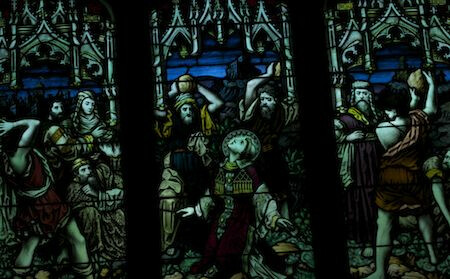Who is the Messiah?

We just celebrated the Feast of the Confession of St. Peter. Here is the Gospel reading from that day:
When Jesus came into the district of Caesarea Philippi, he asked his disciples, "Who do people say that the Son of Man is?" And they said, "Some say John the Baptist, but others Elijah, and still others Jeremiah or one of the prophets." He said to them, "But who do you say that I am?" Simon Peter answered, "You are the Messiah, the Son of the living God." And Jesus answered him, "Blessed are you, Simon son of Jonah! For flesh and blood has not revealed this to you, but my Father in heaven. And I tell you, you are Peter, and on this rock I will build my church, and the gates of Hades will not prevail against it. I will give you the keys of the kingdom of heaven, and whatever you bind on earth will be bound in heaven, and whatever you loose on earth will be loosed in heaven."[1]
The confession of St. Peter, that Jesus is “the Messiah, the Son of the living God,” is a turning point in Matthew’s Gospel. Peter’s confession is so significant that Jesus underscores it as an insight given by God the Father.
So why is the disciple’s understanding of Jesus as the Messiah so pivotal?
Messiah is a title rooted in the Old Testament meaning one anointed with holy oil. The Kings of Israel were often referred to as anointed, such as Saul (1 Sam. 12:3), David (2 Sam. 19:22), Solomon (2 Chron. 6:42), Zedekiah (Lam. 4:20), and even the Babylonian king Cyrus (Isa. 45:1). Though the word is not used, the expectation for a Messiah is established in God’s Covenant with David:
When your days are fulfilled and you lie down with your ancestors, I will raise up your offspring after you, who shall come forth from your body, and I will establish his kingdom. He shall build a house for my name, and I will establish the throne of his kingdom forever.[2]
Through the words of the prophets, an expectation is set for the Messiah to be born in the Davidic line to reform and restore the Jewish nation (cf. Isaiah 11, 40-66).
The Gospel writings bear witness that Jesus is the long-awaited king. Matthew and Luke offer the lineage of Jesus as a descendent of David (Matthew 1, Luke 3). They also refer to as the Christ (cf. Matthew 1:16), a Greek equivalent to Messiah from which we derive words such as chrismation. Andrew went with haste to get his brother Simon (who will be called Peter) when he met Jesus, proclaiming, “We have found the Messiah.”[3]
The conception of Jesus as Messiah to the disciples was a worldly outlook. It was beyond Peter’s imagining that Jesus should go to Jerusalem only to suffer at the hands of the chief priests and the scribes, be killed, and on the third day be raised.[4] The eternal, spiritual nature of the Kingdom of Jesus does not seem to be understood until after his crucifixion and resurrection, when Jesus points his followers back to this teaching.[5]
In Paul’s writings, Jesus is so closely understood as the Messiah that the title is held in close association with his given name as Christ Jesus. In his For Everyone series, Tom Wright translates this as King Jesus to bring out the meaning of Christ as a proper title and convey it’s meaning. An image of Jesus as God’s Messiah is painted by Paul in his letter to the Philippians:
Let the same mind be in you that was in Christ Jesus, who, though he was in the form of God, did not regard equality with God as something to be exploited, but emptied himself, taking the form of a slave, being born in human likeness. And being found in human form, he humbled himself and became obedient to the point of death— even death on a cross. Therefore God also highly exalted him and gave him the name that is above every name, so that at the name of Jesus every knee should bend, in heaven and on earth and under the earth, and every tongue should confess that Jesus Christ is Lord, to the glory of God the Father.[6]
[1] Matthew 16:13-19. Quotations from the Bible are from The New Revised Standard Version Bible, copyright 1989 by the Division of Christian Education of the National Council of the Church of Christ in the USA.
[2] 2 Samuel 7:12-13. The New Revised Standard Version Bible.
[3] John 1:41.
[4] Matthew 16:21.
[5] Luke 24:25.
[6] Philippians 2:5-11.


